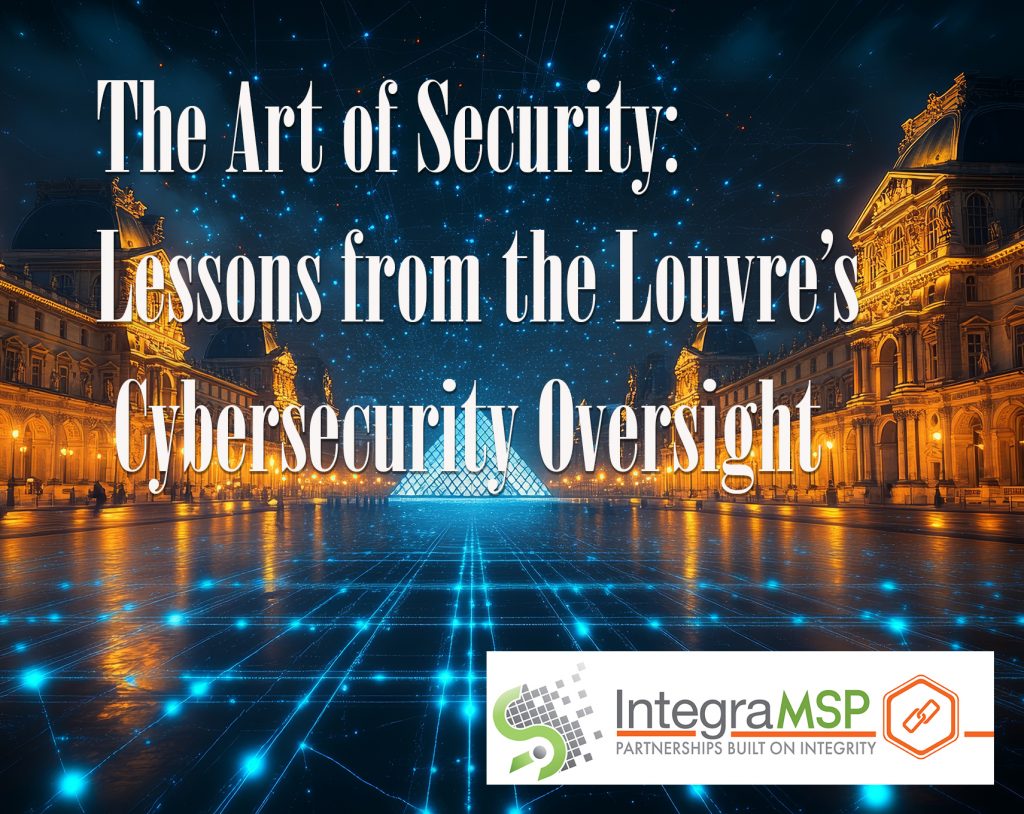
Written by: Suraya Smith – IntegraMSP Client Success Manager
If one of the best-known museums in the world can show major weaknesses in its security posture, imagine what could happen to your business. Last week, we learned that the Louvre’s video surveillance system was protected by the password "Louvre", and museum leadership admitted to “underinvestment” in perimeter security prior to the $102 million jewel heist (ABC News).
It reflects a larger issue that affects organizations everywhere: the tendency to underestimate basic cybersecurity hygiene and failure to proactively invest. The Louvre had functioning cameras and alarms, yet its security infrastructure still failed because its overall system lacked modern safeguards and full coverage. When a password is that predictable, it’s not just a lapse in judgment—it’s an open door.
Too often, businesses make the same mistake. Cybersecurity isn’t a one-time expense; it’s an ongoing process of review, adaptation, and reinforcement. Whether you’re protecting priceless art or confidential client data, underinvestment and a lack of strong policies in core security layers create vulnerabilities that no amount of advanced equipment can offset.
What The Louvre Teaches Us About Cybersecurity
- Start with the basics.Simple or reused passwords are still one of the leading causes of security breaches. Every account—from employee emails to Wi‑Fi networks—should be protected with strong, unique passwords and ideally, multi-factor authentication (MFA). Building a secure foundation starts with getting the small things right.
- Treat cybersecurity as an investment, not an expense.Security isn’t a “set it and forget it” task—it’s an ongoing investment in your company’s stability and reputation. The tools you use today, from firewalls to endpoint protection, need updates, monitoring, and eventual replacement. When you treat cybersecurity as a recurring priority instead of a box to check, you’re better prepared to adapt to new threats and technologies. The Louvre admitted that underinvestment left gaps in its defenses, a mistake any business—big or small—can avoid with proactive planning.
- Make cybersecurity everyone’s responsibility.Technology alone can’t protect your business; it takes everyone on your team. Regular employee training helps staff recognize suspicious emails, unsafe links, and weak password habits. One small mistake can open the door to much bigger risks.
Turning Oversight into Action
The Louvre’s story is a reminder that even the most renowned institutions can suffer major losses when the basics of security are overlooked. A weak password and years of underinvestment left priceless artifacts vulnerable—proof that technology alone isn’t enough without strategy, maintenance, and a proactive mindset.
For your business, cybersecurity doesn’t have to be complicated, but it does have to be intentional. Building good habits, keeping systems up to date, and viewing security as an ongoing investment is what keeps your business safe, resilient, and trusted.
Security isn’t art—it’s discipline. Let’s make sure your business is practicing it every day.



